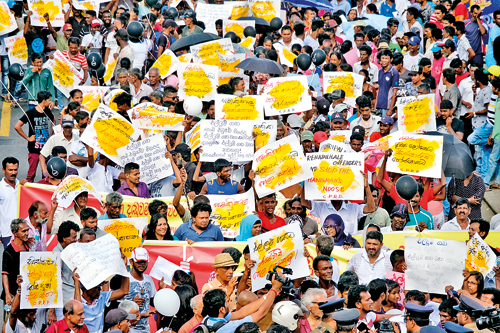News
Bill to kill death penalty; petitions galore amid mounting calls to shut the gallows

Protests against the death penalty in front of the Fort Railway station. Pic by Amila Gamage
United National Party Galle district Parliamentarian Bandula Lal Bandarigoda has submitted a Private Member’s Bill seeking to abolish the death penalty.
The Bill, if approved by Parliament, will abolish the death penalty and replace the death sentence an offence carries under any Act with a maximum of life imprisonment.
The Bill will cover not just sentences imposed after its passage but will also apply to prisoners who have already been convicted and sentenced to death. Accordingly, their punishment will be converted to life imprisonment.
On Friday, Mr Bandarigoda told journalists that the UNP’s Gampaha District MP, Kavinda Jayawardena, and he were cosponsoring the Bill on moral grounds.
“I am a Buddhist and my colleague Mr Jayawardena is a Catholic. As a Buddhist, I have a moral obligation to live by the Buddha’s philosophy, according to which killing is abhorred. Buddhism’ first precept teaches us not to kill. The death penalty allows killing of someone legally. We cannot agree to such a thing, as Buddhism does not allow it,” he said.
Meanwhile the Prisons Commissioner General T.M.J.W. Thennakoon told the Court of Appeal on Friday that he was yet to receive any communication from the President on the date, time and location to execute any condemned prisoner.
The Prisons Commissioner General made this statement when Court of Appeal President Yasantha Kodagoda inquired from him whether he had received any such communication from the President.
The court asked this question when it took up the writ petition filed by journalist Malinda Seneviratne against President Maithripala Sirisena’s decision to implement the death penalty on those sentenced to death for drug offences.
A five-judge Court of Appeal bench comprising its President Justice Yasantha Kodagoda and Justices Deepali Wijesundara, Janak De Silva, Achala Wengappuli and Arjuna Obeysekera is hearing the petition. On Friday, the court said that it would decide on July 17 whether to accept preliminary objections raised by the Attorney General regarding Mr Seneviratne’s petition.
In a related development, the Supreme Court on Friday granted interim relief after considering a fundamental rights petition filed by a death row prisoner. The court issued an order, staying the execution of any condemned prisoners until October 30 this year.
The order was issued by a three-judge bench comprising Justices Buwaneka Aluwihare, Prasanna Jayawardena and Gamini Amarasekara.
The petition was first of the 13 FR cases filed against the decision to implement the death penalty. The petition had been filed by death row prisoner Mohammad Haniffa Praeem Nawas.
His lawyer Kavindu Hewa Geeganage filed the petition through Attorney-at-Law Gowry Sangary Thavarasha and cited the Attorney General, Justice and Prison Reforms Minister Thalatha Atukorale, Prisons Commissioner General T.M.J.W. Thennakoon, Welikada Prison Superintendent T.G. Uduwara, Presidential Secretary Udaya R. Seneviratne, the Human Rights Commission of Sri Lanka and Bar Association President Kalinga Indatissa as respondents.
Making submissions on behalf of the petitioner, M.A. Sumanthiran, PC pointed out that the country’s last execution occurred in 1976 and the death penalty had not been carried out in the country since the enactment of the 1978 Constitution. He argued that the death penalty contravened the Constitution’s Article 11, which prohibits a person being subjected to “torture or to cruel, inhuman or degrading treatment or punishment.”
Deputy Solicitor General Nerin Pulle, who appeared for the Attorney General, contended that the Constitution’s Article 13(4) provides for the implementation of the death penalty as it asserts that “No person shall be punished with death or imprisonment except by order of a competent court, made in accordance with procedure established by law.” He further drew the Court’s attention to Article 16(2), which notes that “the subjection of any person on the order of a competent court to any form of punishment recognised by any existing written law shall not be a contravention of the provisions of this chapter.”
He argued that the imposition of the death sentence was vested with the judiciary and that the President’s role was limited to deciding on the date and place where executions would take place, thus giving effect to a judicial decree.
He said the petition was requesting Court to engage in a post-enactment judicial review, which was not provided for under the Constitution.
Mr Pulle argued that the petitioners had not satisfied the threshold requirement to enable the Court to grant interim relief.
After considering the submissions, Court granted interim relief, issuing a stay order preventing the execution of any condemned prisoner until October 30 this year.
The next hearing date will be on October 29, when the Court will hear all petitions to decide on whether to grant leave to proceed.

